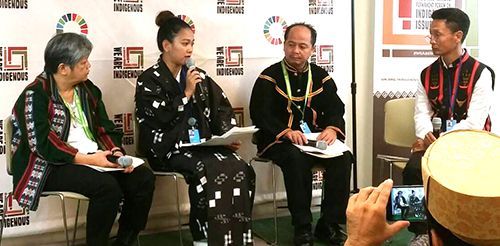ACSILs representative Oyakawa speaks about Okinawa at UN Permanent Forum on Indigenous Issues

On April 18 in New York, Shinako Oyakawa of ACSILs (second from the left) talks about Okinawa's current circumstances.
April 20, 2018 Ryukyu Shimpo
Washington Special Correspondent Yukiyo Zaha reporting
At the UN Headquarters in New York, the Seventeenth Session of the UN Permanent Forum on Indigenous Issues (UNPFII) opened on April 16 to discuss expanding protections for indigenous people’s rights. On April 18, a representative of the Association of Comprehensive Studies for Independence of the Lew Chewans (ACSILs), Shinako Oyakawa, spoke at one of the Forum’s side events. She conveyed the reality that United States military bases were built on Okinawan people’s lands, and that even when Okinawan people demonstrate their will to not allow new bases to be constructed through the election of their representatives, that will is not reflected in decision-making.
The Forum programming was held over a period of five days (as of April 20). Another representative of ACSILs and professor at Okinawa International University, Masaki Tomochi, is attending the Forum along with six other Okinawans.
At an event focusing on the Indigenous Human Rights Defenders and Land Rights in Asia, Oyakawa attended wearing a kimono with her hair tied up in an Okinawan hairstyle called uchinākanpū. She discussed with representatives from the Philippines and Malaysia about the sustainable development of lands that have been traditionally protected by the indigenous people, and rights involving decision-making. They identified the common features of injustice being historically forced upon indigenous people, and affirmed the importance of decision-making being made to reflect indigenous people’s voices.
Oyakawa introduced the history of the Ryukyu Kingdom’s annexation into Japan, and of U.S. military bases being built in Okinawa during the Battle of Okinawa. She also pointed out that sex crimes and murder by soldiers are issues that have persisted due to the presence of military bases. Despite requests that Futenma Air Station be closed down and the land it rests on be returned, the U.S. and Japanese governments are forcing Henoko, Nago to be the site for a replacement facility. Oyakawa pointed out that, “The problem is that [the governments] ignore indigenous people’s voices and charge forward.”
After exchanging opinions, Oyakawa said, “The government belittles Okinawa’s issues, holding that ‘military affairs don’t disrupt the region,’ and ‘it is for the sake of peace and stability in Asia.’ We have been able to share that these claims, and excuses from factions that approve of military bases, are not justifiable.”
(English translation by T&CT and Erin Jones)
Previous Article:Onaga attends Prefectural Office for first time in 12 days, says he is spiritedly doing his best
Next Article:The National Museum of Nature and Science in Tokyo exhibits reconstructed face model of Paleolithic era person
[Similar Articles]
- UN forum Asia delegates declare Japan ignores Okinawans’ indigenous rights in building new base
- Report submitted to UN requesting return of Ryukyuan remains
- The United Nations asks the Japanese government to respect Okinawan people’s opposition against the Henoko relocation plan
- ACSILs holds forum on Ryukyu independence in New York
- International Human Rights Law Association holds Japan-Okinawa debate regarding UN review
 Webcam(Kokusai Street)
Webcam(Kokusai Street)


